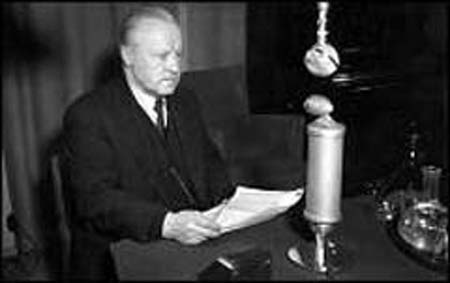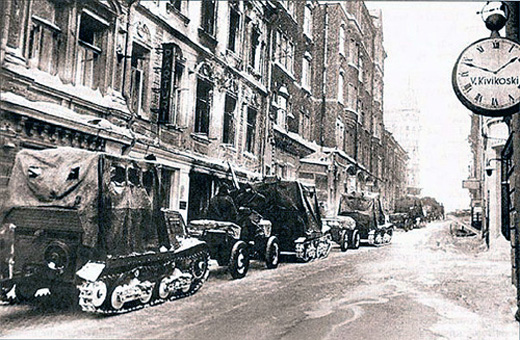Battle of the Atlantic
- U-44 is lost on a mine in the North Sea in a minefield laid by British destroyers Express, Esk, Icarus and Impulsive on the 3rd. The entire crew of 47 is lost.
- The German merchant ship La Coruna (7359t) is intercepted east of Iceland by the British armed merchant cruiser Maloja. Being unable to escape, the German vessel sets herself on fire. The British ship rescues the 68 members of the German crew.
Finland - Winter War
Day 105
After the Finnish delegation have received formal permission from their government, the treaty with the Soviets is signed in Moscow in the early hours of the morning. All hostilities cease on the Finnish front at noon.
In the Taipale and Vuosalmi sectors of the front the Finnish artillery, which has played a major role in the successful defense of these sectors, finally falls silent as the fighting is broken off at 1100 hours. The coming of peace interrupts the Finnish 12th Division's counter-offensive in Kollaa. In the north, the fighting in Juntusranta in the Suomussalmi sector, which had become bogged down into trench warfare, ends at 1100 hours with a ferocious Russian artillery bombardment of the Finnish positions on the Kellojoki River. On the Ladoga Karelia fighting continues throughout the day in the wilds on Group Talvela's southern flank. Neither side manages to get word of the peace agreement to their troops in time to stop the fighting. In the Salla sector in the far north, a Russian battalion in Saija attempts to get around behind Detachment Roininen. The Finns, however, manage to surround the entire Russian battalion.
The Finns have never had more than 200,000 men in the fight and have lost 21,396 dead, 1,434 missing and 43,557 wounded. Altogether the war has absorbed, on the Soviet side, 1,200,000 men and 1,500 tanks deployed in 45 infantry divisions, 4 cavalry divisions and 12 armored groups. Also included for the Soviets were 3,000 planes. Official sources put their losses at 48,000 dead and 158,000 wounded but this may well be a considerable understatement.
Prime Minister Tanner Radio Speech |
 |
This disparity in losses suggests to Allied and Axis observers that the effects of Stalin's officer purges have still not been overcome. This impression of ineffeciency contributes to Hitler's decision to invade the USSR and makes the British and Americans a little reluctant to send supplies to the Soviets when the Germans do invade because they expect that the Germans will win quickly.
Foreign Minister Tanner speaks over the radio at noon to explain the terms of the peace treaty and the factors leading to its agreement. He praises the stamina and endurance of the army and the home front in carrying through a struggle in which Finland was left to stand or fall alone. He also criticizes Finland's Scandinavian neighbors, who have hidden behind their declared neutrality in turning down all requests for help and even preventing Finland from receiving help proffered by the Western Allies. Without assistance Finland could no longer continue the unequal struggle, and the Government was left with no alternative but to attempt a negotiated peace.
In Berlin, different conclusions were drawn from the results of the 'Winter War'. The performance of the Soviet Army did little to lessen the disdain with which Hitler and the Nazis viewed the Soviet regime. Indeed, the fact that a small 'Nordic' country had withstood the onslaught of a nation of 180 million Slavs further convinced Hitler of the overall superiority of the Aryan race. How much worse would the Red Army fare against the might Wehrmacht?
Soviet Trucks in Vyborg |
 |